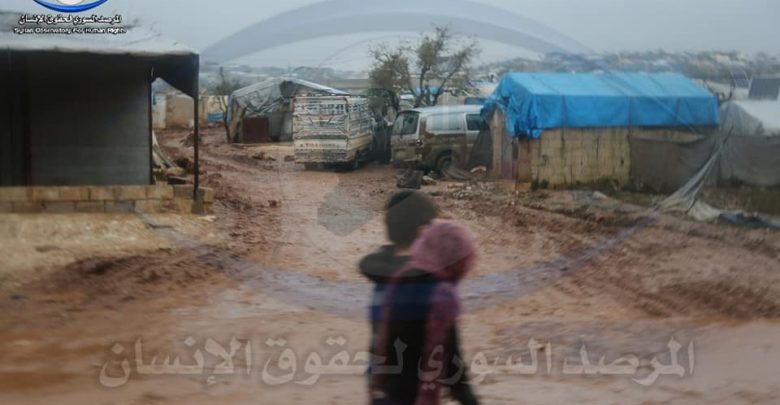A 40-year-old woman cries out for help through the Syrian Observatory: my situation and my children are difficult, we need a shelter urgently
As part of attempts to document the disastrous humanitarian conditions that Syrians are living in camps of the northern countryside of Idlib, the Syrian Observatory for Human Rights obtained the testimony of a 40-year-old woman named Om Abdulrahman, who said she comes from al-Raqqah city and she got married when she was 20 years old and have four children, the oldest is 18 years old and the youngest is 10 years old, she said: “I moved with my husband before his death in 2012 from al-Raqqah city towards the countryside of Aleppo, and then my husband was killed in al-Neirab city during the process of controlling it, to find myself alone wrestling the bitterness of life, and even playing the role of father who must support his children and search hard for their work to secure their needs.”
She continues: “then I was on a new date with displacement in 2015 from Neirab city towards Tal Hawash village in the northern countryside of Hama, where I landed in a small house that my husband’s friend gave us, and because of the lack of a breadwinner, I worked all this time as an agricultural worker in workshops of the village, with a salary of no more than 400 Syrian pounds per day, I managed to send my children to school, after a lot of effort in securing their supplies, I did not think of marrying and leaving my children for an unknown fate, where raising them and serving them was my main concern, and to be honest the village people treated me well, I did not feel as a strange among them and I wouldn’t have thought of leaving it if the recent violent campaign didn’t take place, it was launched by the forces regime on areas of Idlib countryside and Hama and forced all inhabitants of Tal Hawash village to flee their village, and on the 15th of April 2019, I went out with my children and several families to the Syrian north without knowing where we were heading and what our fate was, the only goal was to stay away of the heavy shelling that targeted the village and all the surrounding villages. I went out under the bombardment and shelling without being able to get anything of the furniture out of the house, and we went towards Harem area in which my father-in-law lived and he had an argument with my husband previously, his treatment and the way he received me and my children were bad, it did not indicate that he was their grandfather, but he agreed that I live in a room next to his house, it was a difficult choice for me to live dependent on others but the lack of resourcefulness was the reason.”
Om Abdulrahman added: “more than one month ago he threatens to get me out of the room at any moment, and gives me warnings as a stranger who has nothing no relation to my children, until I get to the point where I begged him to keep me in the room; as I can’t rent a house or even buy a small tent, but he insisted and argued that he intends to marry his son, I have endured several months in that place in the bitterness of living and its difficulties, the living conditions are very difficult, as we suffer from a great shortage of drinking water, the lack of electricity, and a complete absence of food and medical assistance, also the recent rise in products prices has been a major challenge for me, and after a lot of trouble, I found work in one of the agricultural workshops here, so I started working to secure the livelihood of my children, and help them get into school, despite the high cost of school supplies, but I still struggle their future no to be lost, and now I work in pomegranate picking for 700 lira a day, which is not enough to meet our food and drink needs for just one day.”
And through the Syrian Observatory for Human Rights; Om Abdulrahman concluded her testimony by sending an distress call for the humanitarian organizations and charitable bodies operating in the Syrian north to help her and provide assistance, she said: “I appeal to all humanitarian organizations, charities, and responsible parties to provide any possible support to improve my family’s living situation, where I need a place to live in as fast as possible, I also need the costs of teaching my children to ensure that they stay in the school, and we suffer from a great shortage in drinking and usable water, and the price of a tanker of water is more than 3 thousand Syrian pounds, and the lack of electricity, where I am forced with the entry of winter to provide electricity, I hope in the end to return to Tal Hawash village in the northern countryside of Hama, and that the situation to be stable and the displaced people to return to their villages and towns.”

